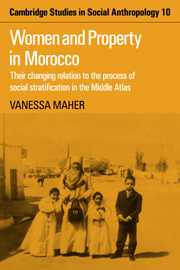 Women and Property in Morocco
Women and Property in Morocco Published online by Cambridge University Press: 27 October 2009
I will show in this chapter how the operations of the market and the qualities appropriate to the successful entrepreneur or capitalist are legitimised by urban religion. I suggest that rural and ‘proletarian’ religion has the opposite tendencies, for it stresses rather the need to communicate with the Great Patron, and to placate belligerent spirits. Moreover it emphasises not the worthiness of the individual but attempts to preserve the solidarity of the segmentary unit, the ksar, by creating religious community among its most tenuously attached members, its women. I show, further, that women are considered intrinsically dangerous to men, and suggest that this belief corresponds to a real antagonism of interests. There is a structural conflict between the social necessity of marriage, and the superior rewards of kinship especially for women.
I mean to use religion in a general sense to refer to that sphere of action and belief where ideas of the supernatural intercept and account for the social and physical orders, introducing into each a symbolic and moral dimension. The symbolic and moral relationships brought thus into dialectic with these orders are conceived both as their cause and as their result, and supply a rationalisation for anomaly and suffering.
As in the case of Buddhism and Christianity, the generality of the statements of Islam and the vast superstructure of commentary make possible a plethora of interpretations.
To save this book to your Kindle, first ensure no-reply@cambridge.org is added to your Approved Personal Document E-mail List under your Personal Document Settings on the Manage Your Content and Devices page of your Amazon account. Then enter the ‘name’ part of your Kindle email address below. Find out more about saving to your Kindle.
Note you can select to save to either the @free.kindle.com or @kindle.com variations. ‘@free.kindle.com’ emails are free but can only be saved to your device when it is connected to wi-fi. ‘@kindle.com’ emails can be delivered even when you are not connected to wi-fi, but note that service fees apply.
Find out more about the Kindle Personal Document Service.
To save content items to your account, please confirm that you agree to abide by our usage policies. If this is the first time you use this feature, you will be asked to authorise Cambridge Core to connect with your account. Find out more about saving content to Dropbox.
To save content items to your account, please confirm that you agree to abide by our usage policies. If this is the first time you use this feature, you will be asked to authorise Cambridge Core to connect with your account. Find out more about saving content to Google Drive.